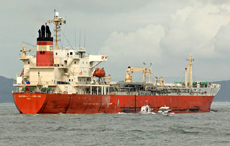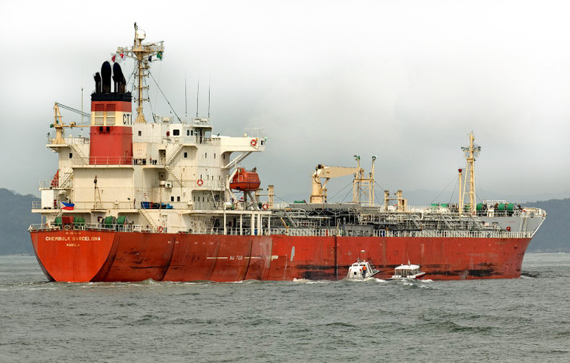|
|

European cars know nothing about ethics |
Nicaragua increases its
ethanol exports to Europe, with 28 million dollars in sales so far this
year.
|

O “Chembulk Barcelona”, barco de bandeira de Singapura,
capitaneado pelo coreano Jo Heung Seob, no qual foi feito o
último embarque de etanol |
Almost at
the same time the 200 people affected by Chronic Renal Failure (CRF) marched
down the 122 kilometers separating Chichigalpa from Managua,
as covered by Giorgio Trucchi in
an article last Wednesday, 16 million liters of ethanol produced in the
Ingenio San Antonio (ISA) mill property of the
Pellas
Group,
were being loaded at Puerto Corinto to be shipped to two
companies in the Dutch city of Rotterdam.
With this
shipment, the ethanol exported this year alone by ISA to European
markets reached a total of 40 million liters. Álvaro Martínez, Sales
and Logistics Director at ISA, informed that in 2007 the company exported 20
million liters, last year the volume of exports increased to 50 million, and
this year it is expected to reach 80 million liters. He said that “the
ethanol shipments are delivered to Rotterdam ports, and from there
they are sent out to fuel companies in Europe.” He also informed that
at 75 US cents per liter, the price paid for ethanol in European markets is
currently one of the highest.
European
buyers don’t seem to care much about the conditions under which workers
plant and harvest the sugarcane used to produce the alcohol for car fuel.
They can’t claim ignorance. In November 2008, the Permanent Peoples’
Tribunal sent a letter to the Italian ambassador to Nicaragua,
with a copy to the President of Italy and the Foreign Minister, in
which it essentially said:
“During the
Permanent Peoples’ Tribunal Mesoamerican hearing on ‘Neoliberal policies,
transnational corporations and economic groups’ (Guatemala, October 10-11,
2008) a number of detail complaints were presented reporting how Ingenio San
Antonio, property of the company Nicaragua Sugar Estate Ltd., a member of
the Pellas Group, used agrotoxic substances carelessly, spraying them
massively in its sugarcane plantations, thus causing serious harm to the
health of its workers, and severely affecting water resources and the
environment in general.”
The
Pellas Group is a huge conglomerate, formed by more than 50 companies
and directed since the early 1980s by Carlos Pellas Chamorro. Its
assets are valued at 4 billion dollars, and it employs around 15,000
workers. The most important companies in
the Group include banking operators, such as BAC International Bank
-a company that operates in every country of Central America, which
also controls the Credomatic network-, and the south Florida-based
BAC Florida Bank. Some of the other companies owned by the Pellas
Group include Nicaragua Sugar Estates Limited, owner of
Ingenio San Antonio, which has an annual production capacity of 250,000
metric tons of sugar, 18 million liters of ethanol, 80,000 metric tons of
molasses, and 60 MW of power, besides having several other projects,
including shrimp production and power generation, with 5,500 blocks of
eucalyptus planted; Compañía Licorera de Nicaragua SA, which produces
the Flor de Caña rum and other alcoholic beverages, as well as methane gas;
and Casa Pellas, the representative of Toyota in Nicaragua.
The
Group also holds a 40 percent interest in GBM, which represents
IBM in Central America and the Caribbean; a 10 percent
interest in Unión Fenosa, the Spanish transnational corporation that
controls electric power distribution in Nicaragua; and another 40
percent interest in ESTESA, Nicaragua’s leading cable television
provider. Also owned by the Pellas Group are Seguros América,
an insurance company, and Aduanera y Almacenadora Pellas S.A (ALPESA),
which offers customs brokerage, goods warehousing, domestic transportation,
and integral global logistics services. In addition, the Group owns
7,000 hectares of orange groves along the San Juan River in southern
Nicaragua, with 1.4 million orange trees planted, and it exports orange
juice to the United States for the Coca-Cola-owned Minute
Maid.
This is the
giant that our affiliate, the Nicaraguan Association of People Affected
by Chronic Renal Failure (ANAIRC), is up against, claiming damages for
the more than 3,209 dead and over 4,000 affected over the past few years by
the indiscriminate use of agrotoxic substances in the sugarcane plantations
of the Pellas Group. But according to the legend, in the end David
defeats Goliath.
 |
|
From
Montevideo,
Enildo Iglesias
Rel-UITA
March
13, 2009 |
 |
|
|
With information from
the Managua newspaper El Nuevo Diario, and the organization
Ethical-Sugar
Photo: pbase.com
The vessel
that transported the last ethanol shipment, the “Chembulk Barcelona,” sailing
under Singaporean flag and captained by Jo Heung Seob, of Korea.
artículos relacionados
|
11-3-2009 Nicaragua
Los
cañeros están en Managua
Movilización de ANAIRC para que
el Grupo Pellas los indemnice
 Giorgio
Trucchi
Giorgio
Trucchi
|
|
10-3-2009 Brasil
O Brasil
dos Agrocombustíveis
Os Impactos das Lavouras sobre a
Terra, o Meio e a Sociedade
Reporter Brasil
|
|
5-3-2009 Estados
Unidos
Los
combustibles “verdes” de Obama
El presidente de Estados Unidos
designó como secretario de
Agricultura y secretario de
Energía a dos militantes de la
biotecnología, que promueven
agrocombustibles cada vez más
peligrosos
Silvia Ribeiro
|
Volver
a Portada
|